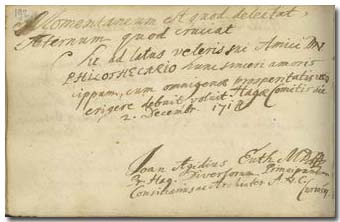
Momentaneum est quod delectat,
Aeternum quod cruciat *
Sic ad latus veteris sui Amici DN. PHILOTHECARIO hunc sinceri
amoris cippum, cum omnigenae prosperitatis voto erigere debuit,
voluit Hagae Comitis die 2. Decembr. 1714
Joan[nes] Aegidius Euth. M[edicinae] D[octor]
Pr[ofessor] Hag[ensis,] Diversorum Principum Consiliarius ac Archiater A[cademiae] N[aturae]
C[aesareae] Curios[orum]
|
* This sententia is frequently quoted by
mediaeval authors, sometimes attributed to St. Augustin, and
sometimes to St. Gregory the Great, but in this form it does
not occur in the church fathers.
|
|
|
Momentary is what delights you, / but eternal is what crucifies.
*
With this I want to erect a memorial column for
sincere love on the side of my old friend PHILOTHECARIUS, and
wishing him all the prosperous things, in the Hague, on December
2, 1714.
Johann Aegidius Euth doctor of medicine,
professor of the Hague, councillor and principal physician of
several princes, and member of the Imperial Academy of Natural
Sciences
|
p.
192. The Hague, December 2, 1714
Euth, Joannes Aegidius
(?-after 1714), German physician
Joannes Aegidius Euth was probably born and learned in Germany;
his father was Adam Euth. According to the data of a dispute of him
in 1667 he was from Nidda of Hessen. He immatriculated in Utrecht
in 1676; the rolls register him as "Hassus, Archiater ducalis,
Saxo-Isenacensis" (that is, born in Hessen, princely physician,
from Eisenach of Saxony). He graduated probably under Henricus
Regius (1598-1679). Previously he had been the court physician of
Prince Johann Georg I, and in April of 1672 he is mentioned of
having accompanied Princess Johanna from Eisenach to the bathes of
Ems like he had often done it in the past. He practised in
Thüringien, Saxony and Hessen, and might have been physician to
ruling princes (archiater). He also visited Gelderland,
's-Hertogenbosch, London and other places. He settled in the Hague
probably before 1680, because his wife comes from the well known
Heynsius family of Amsterdam. He died after 1714. He was a member
of the Academia Leopoldina naturae curiosorum, and had a large
number of friends and supporters both in princely courts and in
the republic of letters. He was an erudite and versatile scholar,
and an orthodox Lutheran, as much as it can be traced in his
writings. His writings: Agonisma iatrikon de hydrope … sub
praesidio … Guernero Rolfincii … submittit … auctor et
respondens Johannes Aegidius Euthius, Nidda Hassus. Jena, 1667.
-
Agonisma de hydrope curiosum ad recentiorum mentem delineatum.
Den Haag, 1700. – Disputatio inauguralis medica de ania.
Utrecht, 1697. – Anatome umbilici curiosa. Leiden, 1697.
Joannes Aegidius Euth recommends his notes to a certain “Philothecarius”,
who is nobody else but the owner of the album. As we have
mentioned in our introductory study written on this Album, the
philotheca, that is, "repository of friends" was another name
for album amicorum. The name "Philothecarius" might have
been formed from this by Euth himself. He indicates, besides his
titles of professor and courtly physician, his membership of the
Academia Leopoldina: "[a member of] A. N. C. (=Academiae naturae
caesareae) Curiosorum". Biographic lexicons do not give his year
of death, only indicate that in 1700 he was still alive. As it is
attested by the present note, he was alive even as late as
in December 1714.
•
AlbUtr 71 • NNBW I 835 |